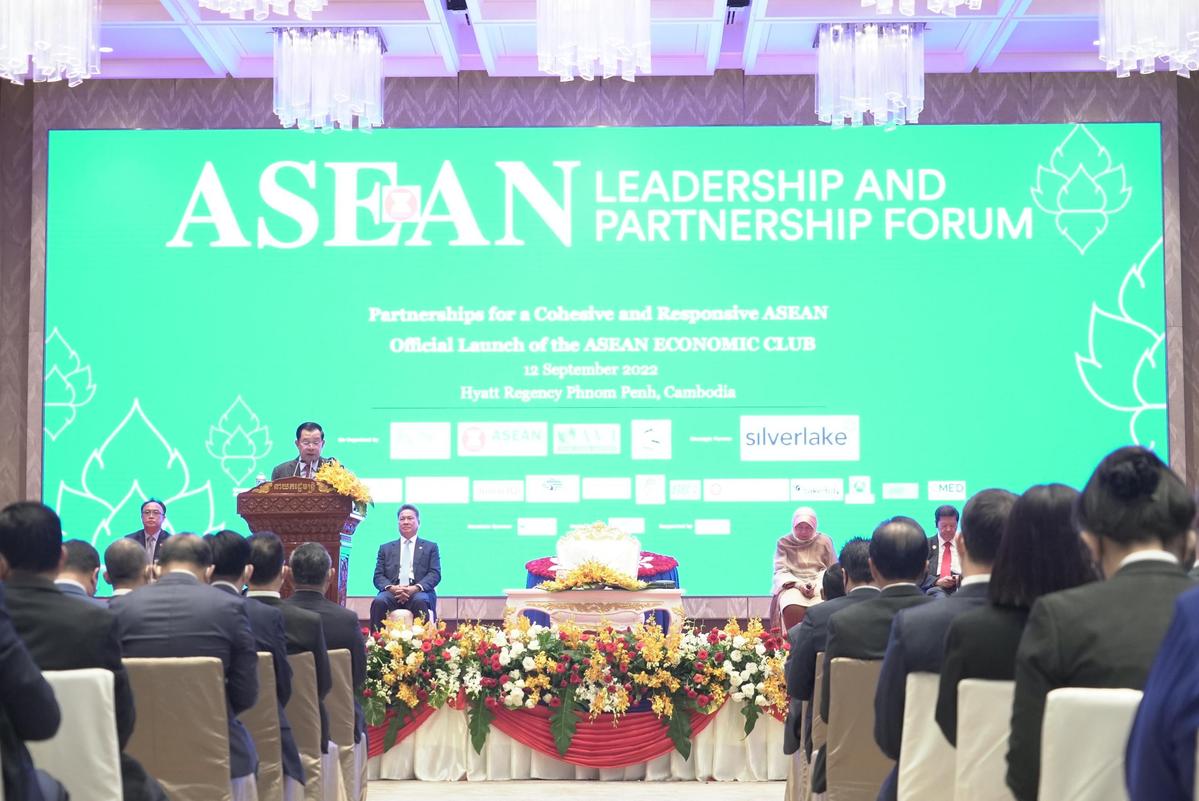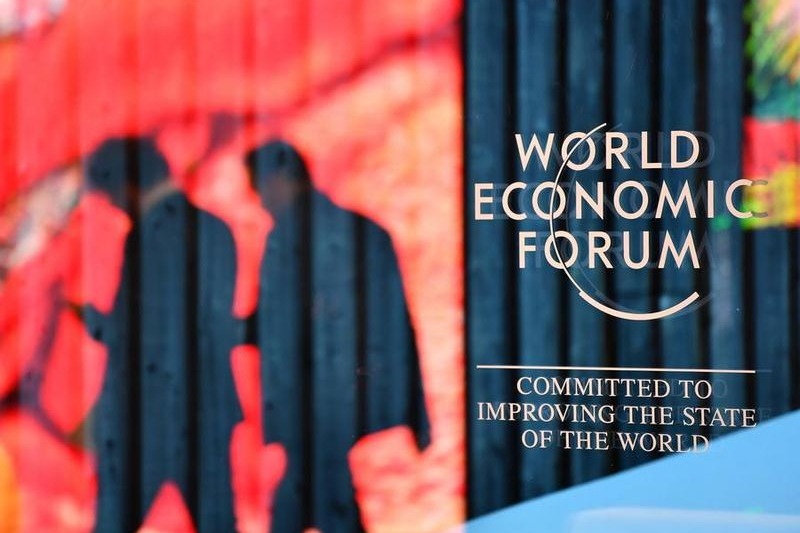ASEAN Economic Club opens with call for inclusive and sustainable recovery
By YANG HAN in Phnom Penh | chinadaily.com.cn | Updated: 2022-09-12 23:51

Cambodian Prime Minister Hun Sen launched the ASEAN Economic Club at a forum on Sept 12 with a call for enhanced cooperation among regional countries for sustainable and inclusive economic recovery.
With challenges like geopolitical tensions continuing to emerge, Hun Sen said the Association of Southeast Asian Nations must be united and strengthen the close partnership in line with the bloc's theme ASEAN A.C.T.: Addressing Challenges Together, which was set by Cambodia as the Chair of ASEAN in 2022.
Speaking at the opening ceremony of the 2022 ASEAN Leadership and Partnership Forum in Phnom Penh, Hun Sen said leadership and partnership are key factors that have enabled ASEAN to overcome obstacles and turn into a region that stands out and thrives.
The event was co-organized by Malaysia-based think tank KSI Strategic Institute for Asia Pacific, ASEAN Business Advisory Council, Phnom Penh-based Asian Vision Institute and Cambodia Chamber of Commerce. China Daily provided media support for the event.
Under the theme "Partnership for a Cohesive and Responsive ASEAN", the forum brought together about 300 high-level delegates from the region and beyond to discuss major trends, major issues and business and investment opportunities in ASEAN.
In order to achieve fruitful results and demonstrate ASEAN's commitment to strengthen cooperation amid turmoil, Hun Sen said it is a must to avoid wars in which there is no winner or loser, but only destruction and loss of people's lives.
"ASEAN must act as a role model and work together to ensure regional peace, stability and prosperity by strengthening ASEAN unity, centrality and strictly adhering to the partnership and multilateral mechanisms to address challenges," said Hun Sen.
ASEAN also needs to continue to promote economic integration, enhance economic security and take full advantage of the opportunities arising from the global trend such as circular economy, and digitalization, he said, reiterating his proposal to establish an ASEAN Green Deal for the region's transition to sustainable development.
The prime minister expressed his support for the establishment of the Cambodian Economic Development Fund at the forum, which will contribute to the digital transformation and technological development, as well as the provision of necessary skills and equipment for the country's workforce in the 4th Industrial Revolution.
He also welcomed the initiative by KSI and the Asian Vision Institute to establish the green economic zone. "Cambodia is ready to host the very first green economic zone," he said.
"For every ASEAN chairmanship there are always challenges, but not (to) the extent of Cambodia's chairmanship," said Sok Siphana, senior advisor to the Cambodian government and chairman of the Board of Directors of the Asian Vision Institute, referring to issues such as geopolitical rivalries, food and energy crisis and supply chain disruptions.
Sok said people should remain optimistic about the outlook for ASEAN as it is one of the most robust regions with a population of over 600 million.
The total combined GDP of ASEAN was valued at $3.2 trillion in 2019, making it the fifth largest economy in the world, according to the ASEAN Development Outlook released last year.
"Cambodia is one of the fastest-growing countries in the world," said KSI President Michael Yeoh, also the forum's founder and chairman, noting the country has maintained an average annual growth rate of 7.7 percent since 1998.
Commenting on Cambodia's success in COVID-19 vaccination, Yeoh said the governments of ASEAN have played a big role in promoting the post pandemic recovery.
"Moving forward, ASEAN will need the 3Ts: tech, talent and trust," said Yeoh, adding it is important to facilitate the role of the private sector in accelerating this growth.
On Sept 11, Cambodian Minister of Commerce Pan Sorasak said at the forum dinner that existing challenges cannot stop ASEAN from moving forward and achieving its mission.
Cambodia will host the 54th ASEAN Economic Ministers' meeting and related meetings from Sept 14 to 18 in the cultural province of Siem Reap. The meetings will bring together economic ministers from ASEAN and its dialogue partners including China.
"The meeting will discuss many important agendas concerning ASEAN economic integration, as well as consultation with our dialogue partners on various issues," said Pan.

Deliver a speech on Revitalizing Agricultural Commodities for Sustainable Economic Recovery, Zuraida Kamaruddin, Malaysian minister of plantation industries and commodities, said the country has been working to ensure that the palm oil industry, a key commodity for Malaysia, operates in accordance with environmental, social, and corporate governance, or ESG, criteria. Yet it has been sanctioned by countries like the United States over forced labor allegations.
She said the claims are not true and that the ASEAN countries have the right to stop this kind of "bullying".
During the two-day forum, panelists discussed key topics included the post-pandemic recovery, ASEAN centrality, digitalization and sustainable development.
Chhem Kieth Rethy, minister delegate attached to the Prime Minister and Secretary of State for Industry, Science, Technology and Innovation of Cambodia, said ASEAN and the world need to address the current pandemic and get prepared for future pandemics.
Chhem said a new type of technology leadership is needed to ensure technological preparedness and to harness technology as a tool to address both present and future challenges.
Mohd Munir Abdul Majid, chairman of ASEAN Business Advisory Council Malaysia and chairman of think tank CARI ASEAN Research and Advocacy, said the private health sector in ASEAN comprises about 53 percent of the total health sector, which makes it necessary to engage them when addressing public health emergencies and disease.
Likewise, noting that 77 percent of Southeast Asians live along the coast or in low lying delta areas, which are threatened by floods, Mohd Munir said there should also be a public-private ESG framework for the implementation of the green transition process, especially in the energy sector.
Rupa Chanda, director of Trade, Investment and Innovation Division of the United Nations Economic and Social Commission for Asia and the Pacific, said people should recognize the huge market access opportunities that will come from trade liberalization.
Chanda said it is essential to recognize the potential that agreements like the Regional Comprehensive Economic Partnership can provide in terms of reorganizing supply chains and keeping markets open.
The RCEP, which comprises ASEAN and its five trading partners, namely China, Japan, South Korea, Australia and New Zealand, came into force this year and is the world's biggest free trade pact.
The entry into force of RCEP at the beginning of this year will undoubtedly spur economic growth, trade and foreign dynamic investment by creating advantage and opportunities for Asian countries, Cambodian Deputy Prime Minister and Foreign Minister Prak Sokhonn told the forum on Sept 11.
Moreover, "it is crucial for ASEAN to consolidate its spirit of togetherness if we want to be effective in navigating through our common, pressing challenges and enhancing ASEAN contribution to regional and local peace, security and sustainable development," said Prak.
Alfredo Perdiguero, director of Regional Cooperation and Operations Coordination Division in the Southeast Asia Department of Asian Development Bank, said the RCEP created enormous opportunities but it is important to educate the private sector to make them understand the trade pact better.
Perdiguero said ASEAN should also work to speak with one voice in international events to enhance its centrality role.
"You can have tough discussions among yourself internally, but then go outside and speak with a single voice," said Perdiguero.
Albert Oung, founder and president of the World Green Organization and chairman of Hong Kong-Myanmar Chamber of Commerce, said he is happy to see that the Cambodia prime minister support the establishment of an ASEAN Green Deal that is proposed based on Asia's situation.
Oung, also chairman of UN ESCAP Green Economy Task Force, said they are coming up with a solution to showcase people what the options are to make leapfrog development toward green economy.
"There are a lot of opportunities around the region, especially in the ASEAN, because the future development will be lying in the Asia-Pacific region where ASEAN is the core," said Oung, hoping to see a green business model.
Answering China Daily's questions, Asian Vision Institute President Chheang Vannarith said the institute is working to develop a concept note of the ASEAN green economic zone for the submission to the prime minister for leaders' consideration before the East Asia Summit, which will be held on the sidelines of the 40th and 41st ASEAN summits and related summits in November.
Acknowledging China's progress in promoting green development, Chheang said China can also play a role and work with ASEAN to jointly pursue green development.
Yao Yuya, CEO of Chinese tech company Huawei Technologies Cambodia, said with more than 125,000 new users connecting to the internet every day in the region, ASEAN is set to become a top 5 digital economy by 2025.
"Digital Infrastructure, particularly connectivity including mobile network, fiber network is the very foundation of digitalization," said Yao when underlining the key elements for digitalization.
Noting the group invests around 15 percent of its annual revenue in research and development, Yao said such investment is made not just for business profits, but also for contributing to the society leveraging digital inclusion initiatives.
For example, by providing the smart photovoltaic solar solution, Huawei helped the Royal Phnom Penh Hospital adopt clean energy technology and boost sustainability.
























